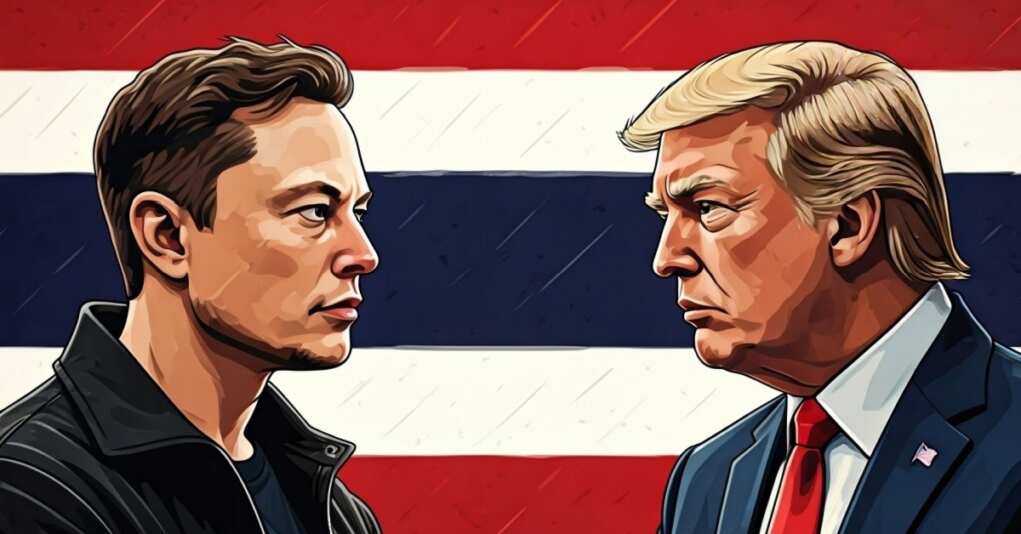Trump Quashes ‘President Musk’ Rumors: ‘He’s Not Going to Be President’

In a political landscape where reality often outpaces satire, President-elect Donald Trump has addressed the burgeoning speculation that Elon Musk, the tech mogul and his recent appointee, is the de facto leader of the free world. Speaking at the Turning Point USA’s AmericaFest conference in Phoenix, Trump quipped, ‘All the different hoaxes, and the new one is, ‘President Trump has ceded the presidency to Elon Musk.’ No, no. That’s not happening.’ He further clarified, ‘He’s not gonna be president, that I can tell you.’
This clarification comes amid a flurry of Democratic jabs suggesting that Musk, the South African-born billionaire, is pulling the strings behind the scenes. Their jesting insinuations of ‘President Musk’ have gained traction, especially after Musk’s vocal opposition to a recent spending bill, which led to significant revisions and a narrowly averted government shutdown.
Let’s unpack this. Elon Musk, the man who revolutionized electric cars, launched reusable rockets, and is now spearheading the Department of Government Efficiency (DOGE), is suddenly the puppet master of American politics? It’s a narrative so rich it could power a Tesla for a thousand miles.
The Department of Government Efficiency, affectionately acronymed as DOGE, is tasked with streamlining federal operations, cutting waste, and, presumably, ensuring that bureaucratic red tape doesn’t strangle the nation’s productivity. Musk, alongside biotech entrepreneur Vivek Ramaswamy, is set to lead this commission, aiming to ‘dismantle government bureaucracy, slash excess regulations, cut wasteful expenditures, and restructure federal agencies.’
Critics argue that Musk’s influence is overshadowing traditional political processes. They point to his recent interventions, such as opposing the initial spending bill proposed by House Speaker Mike Johnson. Musk’s public denouncement led to a scramble on Capitol Hill, with lawmakers revising the bill to align more closely with his and Trump’s fiscal preferences.
However, the Constitution remains a pesky barrier for Musk’s hypothetical ascension to the presidency. Born in Pretoria, South Africa, Musk doesn’t meet the ‘natural-born citizen’ requirement outlined in Article II, Section 1. Trump’s reminder of this fact serves as a constitutional reality check amid the speculative frenzy.
It’s worth noting that Musk’s political evolution has been nothing short of meteoric. Once a self-proclaimed supporter of Democratic ideals, Musk’s alignment has shifted, culminating in his endorsement of Trump during the 2024 election cycle. His financial contributions, reportedly exceeding $200 million, and his appointment to DOGE underscore his deepening involvement in shaping the nation’s policy direction.
Yet, the notion that Trump would cede the presidency to anyone, let alone a tech billionaire, is as plausible as California seceding from the Union. Trump’s persona is synonymous with leadership and control; the idea of him playing second fiddle is antithetical to his very being.
In the grand theater of politics, the ‘President Musk’ narrative serves as a convenient distraction, diverting attention from substantive policy debates to the realm of speculative fiction. It’s a storyline that entertains but ultimately detracts from the pressing issues at hand.
As the nation prepares for Trump’s second term, the focus should perhaps shift from the fantastical to the factual. Musk’s role in the administration is significant, but it operates within the constitutional framework that defines American governance. The real work lies ahead: addressing the federal deficit, reforming government operations, and steering the country toward sustained prosperity.
In conclusion, while the ‘President Musk’ moniker makes for catchy headlines and spirited water cooler conversations, it’s a constitutional impossibility. Trump’s reaffirmation of his presidential authority serves as a reminder that, in American politics, the office of the presidency is neither for sale nor subject to whimsical reassignment, regardless of one’s net worth or technological prowess.
